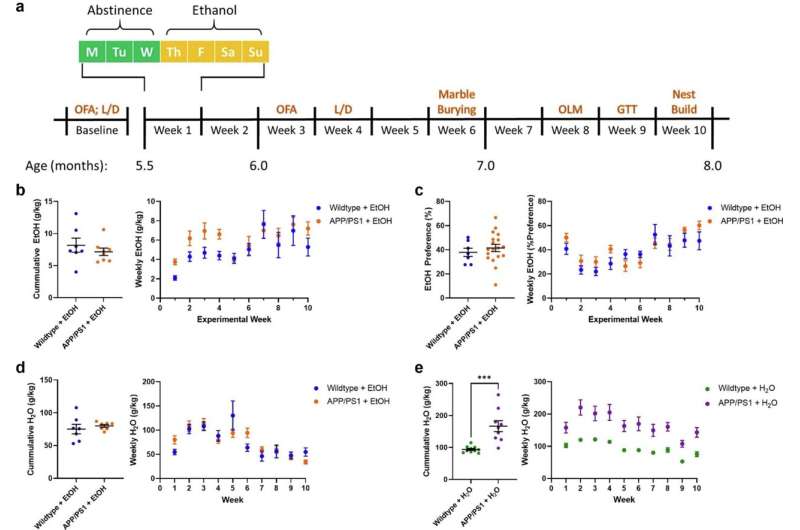This article has been reviewed according to Science X's editorial process and policies. Editors have highlighted the following attributes while ensuring the content's credibility:
fact-checked
peer-reviewed publication
proofread
Study suggests alcohol consumption linked to acceleration of Alzheimer's disease

Alzheimer's disease is the most common form of dementia, accounting for 60% to 80% of dementia cases, according to the Alzheimer's Association. While current research suggests alcohol use disorder is a risk factor in Alzheimer's disease, the impact alcohol use disorder has on Alzheimer's disease pathology is an area of continued research.
In a new preclinical study, scientists at Wake Forest University School of Medicine showed that even modest amounts of alcohol can accelerate brain atrophy, which is the loss of brain cells, and increase the number of amyloid plaques, which are the accumulation of toxic proteins in Alzheimer's disease.
The study appears in Neurobiology of Disease.
"These findings suggest alcohol might accelerate the pathological cascade of Alzheimer's disease in its early stages," said Shannon Macauley, Ph.D., associate professor of physiology and pharmacology at Wake Forest University School of Medicine.
The study was a collaboration led by Macauley and Jeffrey Weiner, Ph.D., professor of physiology and pharmacology at Wake Forest University School of Medicine, through the medical school's Alzheimer's Disease Research Center and Translational Alcohol Research Center.
Using mouse models of Alzheimer's disease-related pathology, researchers used a 10-week chronic drinking approach where mice were given the choice to drink water or alcohol, mimicking human behavior regarding alcohol consumption. They then explored how voluntary, moderate consumption of alcohol altered healthy brain function and behavior and whether it altered the pathology associated with the early stages of Alzheimer's disease.
The researchers found that alcohol increased brain atrophy and caused an increased number of amyloid plaques including a greater number of smaller plaques, potentially setting the stage for increased plaque proliferation in later life.
Interestingly, researchers also noted that acute withdrawal of alcohol increased the levels of amyloid-beta, which is a key component of amyloid plaques that accumulate in Alzheimer's disease.
Further analysis showed that chronic alcohol exposure poorly regulated brain and peripheral metabolism—another way to accelerate Alzheimer's disease pathology. Macauley previously showed that elevated blood sugar increases amyloid-beta and amyloid plaques. In the current study, researchers found that even moderate drinking caused elevations in blood sugar and markers of insulin resistance, which increases the risk not only for Alzheimer's disease but also for other diseases such as type 2 diabetes and cardiovascular disease.
The study also found that moderate alcohol use altered anxiety and dementia-related behaviors.
"These preclinical findings suggest that even moderate consumption of alcohol can result in brain injury," Macauley said. "Alcohol consumption may be a modifiable risk factor for Alzheimer's disease and dementia."
More information: Stephen M. Day et al, Ethanol exposure alters Alzheimer's-related pathology, behavior, and metabolism in APP/PS1 mice, Neurobiology of Disease (2022). DOI: 10.1016/j.nbd.2022.105967




















